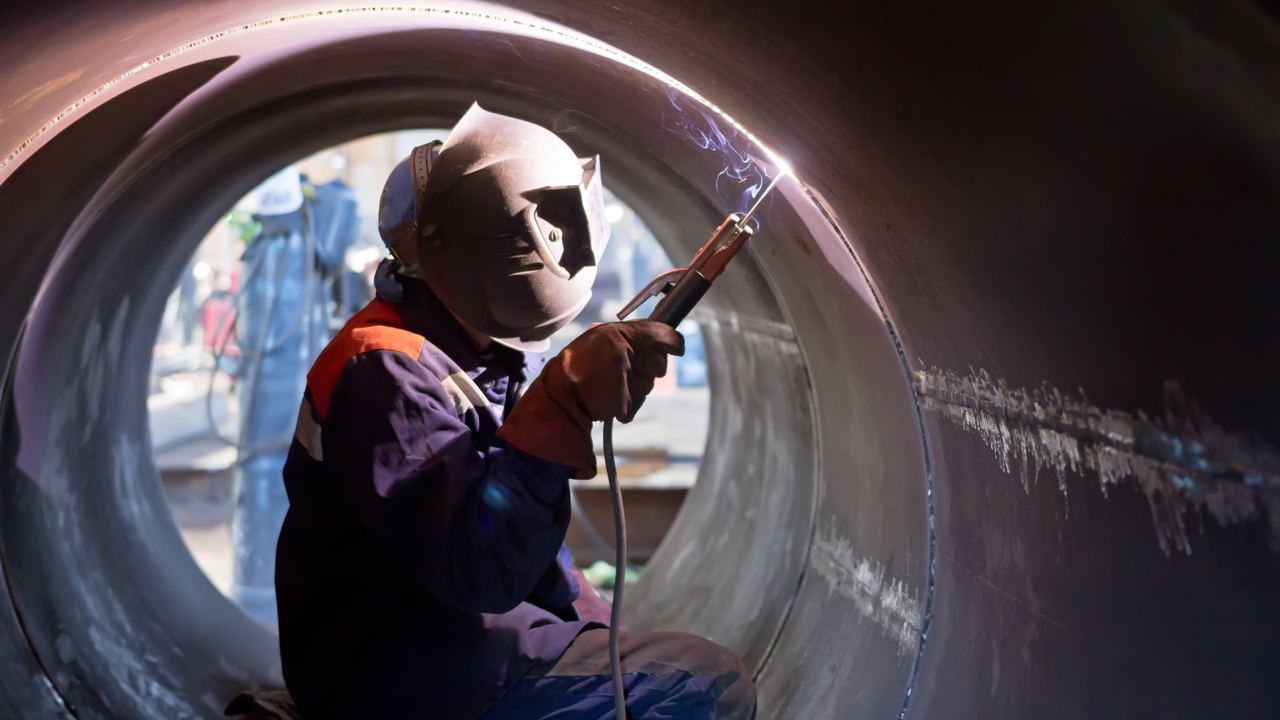Manufacturing and Production Career Guide
Sectors / 17 April 2023
The UK’s manufacturing and production industry generates billions of pounds per year. Companies in this space produce and sell food, vehicles, furniture, aerospace and military equipment, and more.Careers in manufacturing and production span a wide range of jobs, from entry-level, hands-on work to senior managerial and strategic roles.
This career guide will focus on three job roles in manufacturing and production: manufacturing engineer, process operative, and fabricator.

Potential Roles in Manufacturing and Production
The manufacture and production of goods involves several stages, including innovation, ideas development, planning, making or assembling the physical product (or maintaining the machinery that does), packaging and shipping. Jobs can be either hands-on, where you are directly involved in producing goods, or hands-off, where you plan, oversee and manage the process.
Manufacturing engineers are responsible for designing, building, maintaining and improving the machinery and processes used in manufacture and production. A manufacturing engineering job requires a high level of skill and advanced training but offers exciting career prospects and attractive pay in return. Manufacturing engineers keep the costs and environmental impacts of manufacturing processes as low as possible and play a vital role in the wider team.
Process operatives (sometimes called production operatives or factory workers) work on the production line in a factory, making, assembling or packaging goods like food items, equipment and furniture. Your daily work can vary depending on the sector in which you work. Some process operative jobs, for example, in the automotive, aerospace and agricultural sectors, may require you to handle industrial machinery and large materials. Process operative jobs can be repetitive and involve doing the same task day after day, which suits some personality types more than others.
Fabricators are technicians who use raw materials (usually metal) to create products or parts to set specifications. A job as a fabricator involves skilled manual work that requires specific training and expertise. Most fabricators are trained welders and are comfortable using a range of specialised tools and working in a very physical, hands-on role.
Salary and Career Progression
There are many different job roles within manufacturing and production, all with varying scopes of progression opportunities and pay.
Manufacturing engineers can work their way up in the industry through further experience and training after completing initial engineering qualifications. Some decide to study for chartered engineer status (CEng) in their chosen engineering speciality. The CEng award is an industry qualification from the Engineering Council that can open up opportunities for more specialised and highly paid roles.
Newly qualified engineers who go into the manufacturing industry can expect to start at around £25,000 and earn upwards of £40,000 with experience and £60,000 and more with chartered engineer status.
Process operative jobs are often entry-level positions with limited progression opportunities, particularly in some sectors, like food production. The barrier to entry is low, and many employers will train process operatives on the job. Salaries typically range from around £14,000 to £26,000.
Fabricators can progress by learning specialised techniques like Metal Inert Gas (MIG) or Tungsten Inert Gas (TIG) welding, moving into planning and developing products, or managing a team of fabricators or welders. Fabricators typically earn between £20,000 and £30,000 per year.
Qualifications, Education and Experience
Manufacturing engineers are educated to a high level and must gain industry qualifications to practice as an engineer. The following may be necessary or advantageous:
- 4-5 GCSEs grades 4-9 (C-A**)
- 2-3 A Levels to access an undergraduate degree
- An apprenticeship or other vocational course to access an undergraduate degree
- A Bachelor’s degree in a relevant field of engineering recognised by a professional body
- Postgraduate qualifications, such as a Master’s degree or postdoctorate
- Chartered engineer status
- Registration with the Engineering Council
Process operatives do not need any specific education or qualifications, but the following could be beneficial:
- Some GCSEs, particularly in maths and English
- Experience working in a factory or production line
- Fluent in spoken and written English
Fabricators must learn the practical skills needed to work with raw materials and create physical products through academic courses or on the job. The following can be helpful:
- 4-5 GCSEs grades 4-9 (C-A**)
- An apprenticeship in Fabrication and Welding
- A diploma in a relevant subject, like Fabrication and Welding Engineering
- Experience working in a relevant area
- An industry-recognised welding course

Skills
Manufacturing engineers rely on a mix of advanced skills to do their job well, including:
- Excellent written and verbal communication skills
- Technical know-how
- Innovative and fresh thinking
- Confidence to challenge the status quo
- Good grasp of mathematics, including some advanced principles
- Attention to detail
- Logical and methodical thinking
- Project management skills
- Good timekeeping and time management skills
Process operatives can find the following skills valuable:
- Patience
- Willingness to do repetitive tasks
- Dexterity
- Knowledge of health and safety regulations
- Understanding of food safety regulations if working in food production
- Works well with others
- Takes direction well
Fabricators rely on practical skills to handle the materials and machinery involved in the job. The following can be beneficial:
- Dexterity
- Attention to detail
- Respect for health and safety measures
- Sound risk assessment skills
- Enjoyment of manual work
- Comfortable using equipment and machinery if necessary
Working Hours
Production lines typically run 24 hours a day, seven days a week, to maximise output and avoid downtime. If you work in production (as a process operative or fabricator, for example), you will likely work shifts to cover evenings, weekends and nights.
Those in strategic and planning roles are more likely to work office hours of 9am to 5pm, Monday to Friday. However, manufacturing engineers might be expected to provide on-call cover to deal with breakdowns or issues outside working hours.
Notable Locations
The UK offers plenty of opportunities for work in the manufacturing and production industry in numerous locations around the four home nations.
Some of the areas known for manufacture include:
- Sheffield
- Bristol
- Cambridge
- Milton Keynes
- Nottingham
- Leeds
- Liverpool
- London
Notable Companies
- Siemens: electronics manufacturer working in multiple sectors, including transport and healthcare, with offices all across the UK
- GE: global company specialising in machinery manufacturing. Employs over 8000 people in the UK and Ireland
- Jaguar Land Rover: global brand and leading luxury automotive and consumer product manufacturer that offers in-house development with its own Jaguar Land Rover Learning Academy
- Associated British Foods: the UK’s biggest food manufacturer, owning brands including Twinings, Patak’s and Kingsmill
- BAE Systems: the UK’s largest manufacturing employer, specialising in the production of defence equipment for the British armed forces
Next Steps
Sign up to JobLookup for the latest manufacturing and production jobs straight to your inbox, and don’t forget to check out The Ultimate Jobseeker Guide for tips and advice on landing your next role.



